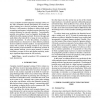Free Online Productivity Tools
i2Speak
i2Symbol
i2OCR
iTex2Img
iWeb2Print
iWeb2Shot
i2Type
iPdf2Split
iPdf2Merge
i2Bopomofo
i2Arabic
i2Style
i2Image
i2PDF
iLatex2Rtf
Sci2ools
ICASSP
2008
IEEE
2008
IEEE
Effective error prediction using decision tree for ASR grammar network in call system
CALL (Computer Assisted Language Learning) systems using ASR (Automatic Speech Recognition) for second language learning have received increasing interest recently. However, it still remains a challenge to achieve high speech recognition performance, including accurate detection of erroneous utterances by non-native speakers. Conventionally, possible error patterns, based on linguistic knowledge, are added to the ASR grammar network. However, this approach easily falls in the trade-off of coverage of errors and the increase of perplexity. To solve the problem, we propose a method based on a decision tree to learn effective prediction of errors made by non-native speakers. An experimental evaluation with a number of foreign students in our university shows that the proposed method can effectively generate an ASR grammar network, given a target sentence, to achieve both better coverage of errors and smaller perplexity, resulting in significant improvement in ASR accuracy.
| Added | 30 May 2010 |
| Updated | 30 May 2010 |
| Type | Conference |
| Year | 2008 |
| Where | ICASSP |
| Authors | Hongcui Wang, Tatsuya Kawahara |
Comments (0)

